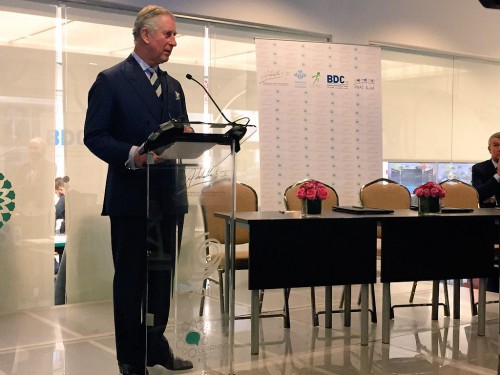7th February 2015
The Jobs Challenge
In the charming Jordanian film Captain Abu Raed, a young boy from East Amman tells his friends that people like us don’t get good jobs. In the end, he becomes a commercial pilot with Royal Jordanian.
The point is that getting a job shouldn’t depend on where you are from or what your connections are. If you are smart and work hard, you can achieve your ambition.
This is true all over the world, not just in Jordan. This point was illustrated in Davos by the UN goodwill Ambassador – and former Harry Potter actress – Emma Watson. Asked on Twitter for advice by a girl whose father was telling her she shouldn’t become an engineer, her answer was simple and direct: “Become an engineer”.
Young people need to break out from an attitude that typecasts them into jobs that are deemed ‘acceptable’ or ’prestigious’. An example of damaging attitudes is the so-called ‘culture of shame’ which makes people think that washing dishes or cleaning streets is somehow dishonourable.
Such attitudes are old-fashioned and increasingly counter-productive. Surely a person achieves honour and dignity by putting food on his or her family’s table? Far better to be employed – whatever the job – than to sit at home with a Masters degree that no employer is interested in.
After all, finding a job these days isn’t easy, especially a first job. The IMF says that 31% of 15-24 year olds in Jordan are unemployed, one of the highest rates in the world. Almost a quarter of male graduates and three-quarters of female graduates are without jobs. This is a tremendous waste of talent.
What can be done? First, countries need to assess and analyse where the potential for job-creation lie. The motor for growth anywhere is the private sector. Only they can invest in new, productive jobs.

Next: what are those businesses looking for? Do they want more bachelor’s degrees in humanities? Or are they looking for scientists? Or, as is increasingly the case in Europe, is the subject a person has studied not the decisive criterion?
Private sector employers in Jordan regularly tell me that the key factor in employing a person is not the subject of their degree. What they want is skills: the underlying abilities like leadership, customer awareness, team-building, critical thinking, decision-making, and communications. If a person can demonstrate these skills, a company can give them the knowledge they need.
This fact is behind the British Embassy’s support in Jordan for the Business Development Centre’s ‘Maharat’ programme, designed to take young graduates and supplement their degree with core skills.
The results of this programme are impressive: in the last 2 years it has helped 3,142 young people into jobs. And that is not only in Amman. The programme is also run in Irbid, Kerak, Tafileh and soon in Ma’an. It is part of the UK’s £220 million support for Jordan in the last 3 years.
The theme of Employment and Employability was the focus of a unique event organised this week at the Zain Innovation Centre by the Embassy and the King Abdullah Fund for Development. Called “Learning from Experience” it enabled 70 young Jordanians to test and hone their business skills with successful businessmen and with organisations like BDC and Injaz.

The event was honoured with the presence of HRH Prince Charles who launched the work of his charity Princes Trust International in Jordan. They will bring their experience and expertise from helping over 800,000 young people into employment or training in the UK in the last 40 years. Their future collaboration with KAFD, BDC and Injaz is a tangible demonstration of the UK’s support for jobs in Jordan.
No doubt the young boy in Captain Abu Raed found that getting a job wasn’t easy. The key for young people facing the jobs challenge is to take the opportunities they are offered and to get stuck in. Further and better opportunities will follow.